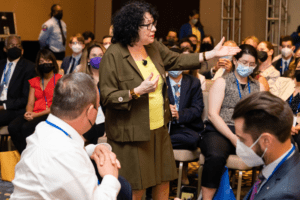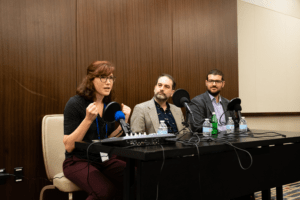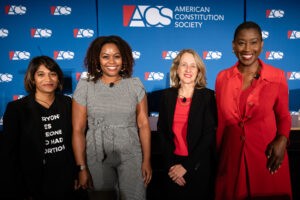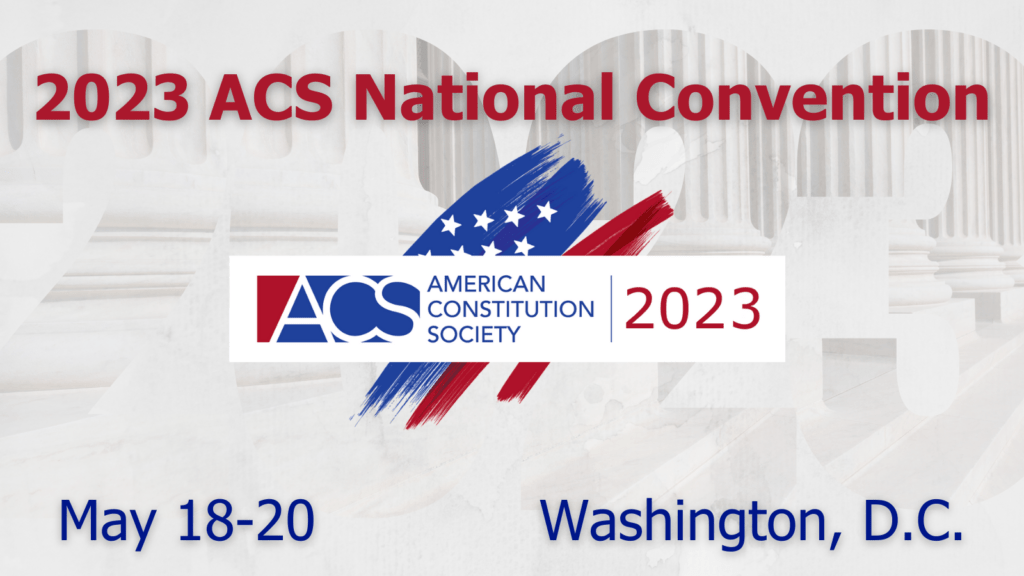2022: A Year in Review
ACS focused its work in 2022 around “democracy’s moment of truth,” recognizing the different and compounding threats confronting constitutional democracy in this country and heading into the 2022 midterms. From the threat of election subversion to the increasing devastation wrought by the U.S. Supreme Court’s conservative supermajority, to the growing effort by factions of the Right to radically rewrite the U.S. Constitution through an Article V Convention, ACS met the moment. This year, ACS helped the Biden-Harris administration and the U.S. Senate make history in diversifying the federal bench with its unprecedented progressive judicial pipeline; took Supreme Court reform from a niche issue to a mainstream topic with steadily growing political support; recruited hundreds of people to serve as poll workers; and mobilized voters around down ballot races that are instrumental in safeguarding the rule of law and our democracy at the state and local levels.
Courts Matter and Who Sits on Them Matters
|
Diversifying the Federal Bench
The Biden-Harris administration has made history in their first two years in the number of federal judges they have confirmed and in diversifying the federal court. This success is built in no small part on the infrastructure of ACS’s Path to the Bench Project, which has built a national judicial pipeline of diverse judicial candidates who are committed to the Constitution and to vindicating our fundamental rights. This pipeline is the work of ACS’s 55 working groups across 42 states, each made up of lawyers who are immersed in their state and local legal communities. The White House has described ACS’s Path to the Bench Project as “ridiculously helpful” in its success filling federal court vacancies and diversifying the federal bench.
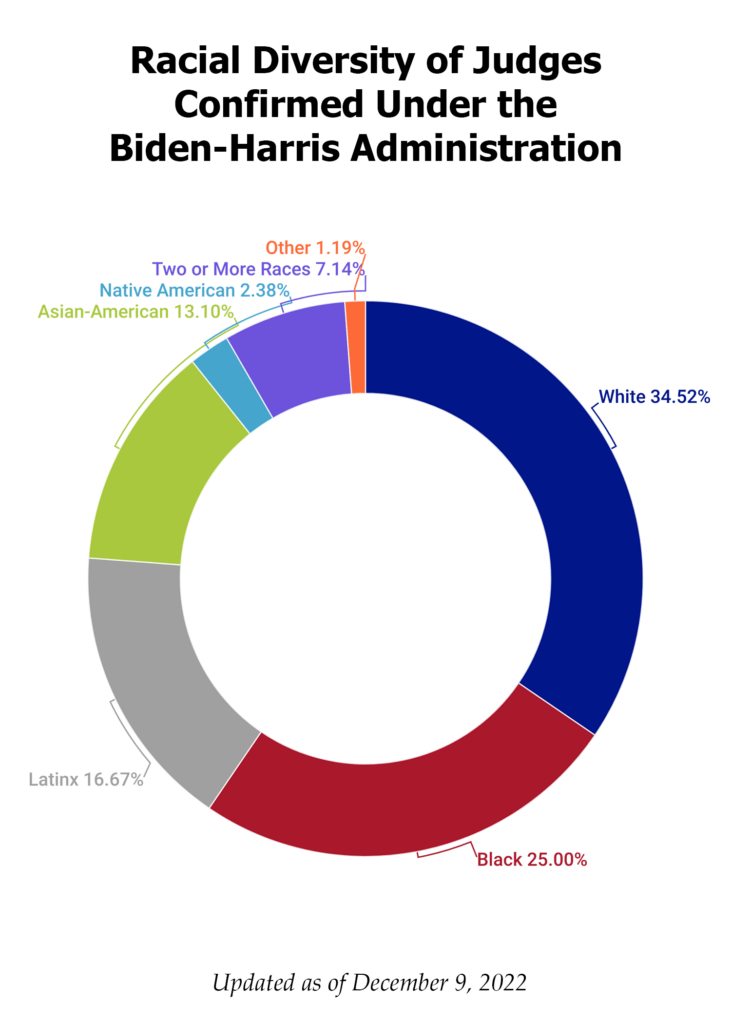 |
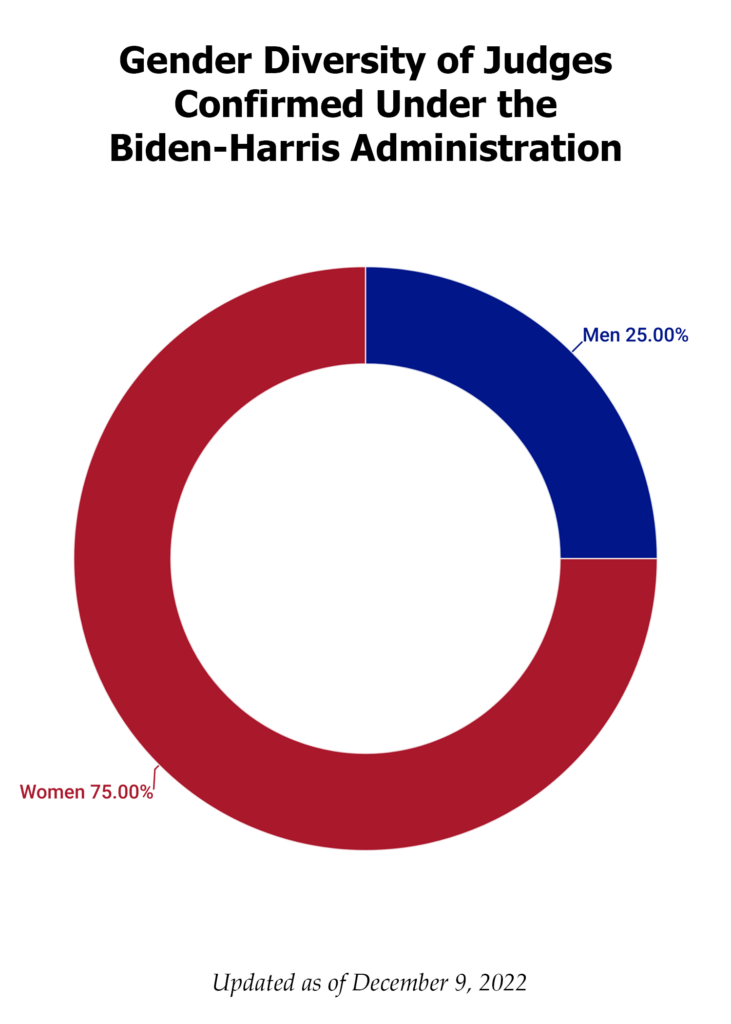 |
The Biden-Harris administration nominated 142 people to Article III courts, and 95 have confirmed by the Senate as of December 9. Of these nominees, roughly one-third were identified and/or recruited through ACS’s Path to the Bench Project.
As part of the Path to the Bench Project, ACS also grew its judicial clerkship program in 2022, reaching over 1,000 law students. As part of this effort, ACS national staff met individually with 160 ACS members to explain the clerkship application process. ACS also expanded its clerkship mentor matching program and provided a select cohort of diverse, highly-qualified law students with additional counseling on application strategies, connections with former clerks, and outreach to judges on their behalf.
Tracking the Federal Judicial Nominations Process
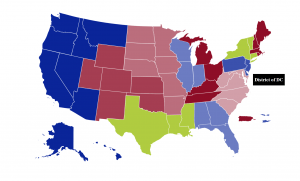 Throughout 2022, ACS continued to track the entire federal judicial nominations process, from vacancy announcements to confirmations, and provided this information to the public on its website. This information and the diversity information that ACS compiles about the federal courts are frequently cited in the press and used by coalition partners and Senate offices.
Throughout 2022, ACS continued to track the entire federal judicial nominations process, from vacancy announcements to confirmations, and provided this information to the public on its website. This information and the diversity information that ACS compiles about the federal courts are frequently cited in the press and used by coalition partners and Senate offices.
Expanding Path to the Bench Project to the States
In the wake of the U.S. Supreme Court’s devastating decision in Dobbs v. Jackson Women’s Health, state courts are now on the frontlines of protecting abortion rights. They are also increasingly on the frontlines of safeguarding our democracy and election security. Building off the infrastructure ACS established with its federal judicial pipeline, ACS expanded its work into state courts in 2022, with a plan for further growth in the coming years. ACS is actively engaged on state judges in California, Georgia, Michigan, Minnesota, New York, Oregon, Virginia, and Wisconsin, and our work is already seeing success on this front.
MinnesotaThe judicial appointments team for Minnesota Governor Tim Walz meets regularly with members of the ACS Path to the Bench Working group as part of its work to recruit qualified, diverse judicial candidates. ACS’s Minnesota working group recently held a retreat to develop a formal process for sending recommendations from the chapter to the governor’s office. |
 |
OregonACS’s Oregon working group will be submitting recommendations to Governor Kate Brown for its Supreme Court vacancy and future Court of Appeals vacancies. They’ve also identified opportunities to work with Governor-elect Tina Kotek. |
 |
WisconsinACS’s Wisconsin working group responded to the 2018 election of Governor Evers by ensuring that diverse, progressive lawyers applied to be on the Wisconsin Judicial Selection Advisory Commission. The Chair of one of our Wisconsin Lawyer Chapters was ultimately selected for the Commission, and the Commission has since made increasing diversity on the Wisconsin state courts a priority. About half of the judges that Governor Evers has appointed have been people of color and about half have been women. |
 |
Bolstering Support for Justice Ketanji Brown Jackson
ACS leveraged our national network to raise awareness of Justice Ketanji Brown Jackson’s exceptional qualifications when she was nominated to fill Justice Stephen Breyer’s seat on the U.S. Supreme Court and throughout her confirmation process. Our chapters coordinated several letters to the Senate Judiciary Committee in support of then-Judge Jackson’s nomination. These letters entered the Senate Judiciary Committee record and countered the distorted, racist attacks on her record and qualifications. One letter written by Brigham Young University law professors even contributed to securing U.S. Senator Mitt Romney’s vote in support of Judge Jackson’s confirmation.
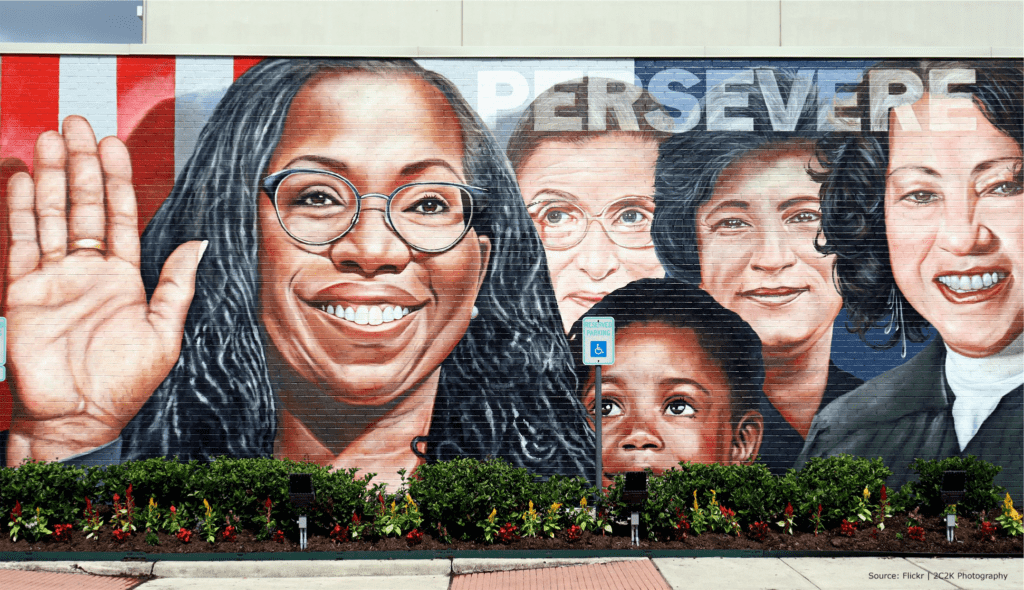
Promoting Supreme Court Reform
The U.S. Supreme Court is facing an existential legitimacy crisis with public confidence in the Court falling year over year. With robust digital communications, direct outreach to elected officials and the White House, both national and chapter programs, and its signature podcast “Broken Law,” ACS helped make Supreme Court reform mainstream in 2022. More Senators and Congresspeople spoke out about the harm being wrought by this packed Supreme Court and more organizations joined in advocating for Supreme Court reform because of ACS. For example, at an ACS Chapter event this year, a principal at a partner organization commended ACS for being a leader on Supreme Court reform: “ACS arrived on time to this conclusion [about the need for SCOTUS reform], and we were late. Many impact litigation organizations have yet to join us in calling for these reforms. But if the best time to identify the need for reform is when ACS did it, the second-best time is surely any time after that.”
Defending the Rule of Law
With existing projects and with a new initiative launched this year, ACS defended the rule of law in 2022.
State Attorneys General Project
ACS’s State Attorneys General Project continued to grow in scope and impact in 2022. The Project brings together more than 20 state attorneys general offices (AGOs) to share expertise and lessons learned on the most pressing legal challenges facing states. In 2022, this included the launch of a new working group focused on how state AGs can address disparities in health and health care, and special convenings on protecting reproductive rights in the wake of Dobbs v. Jackson Women’s Health and on how State AGs can advance truth, racial healing, and transformation at the state level.
Run.Vote.Work. Initiative
In response to the rising threat of election subversion, ACS launched its Run.Vote.Work. Initiative in 2022. This new initiative brings together existing ACS efforts, including Election Day Class Cancellation, election protection, and career pipeline work, with new concerted efforts to mobilize voters around down ballot races that are on the frontlines of safeguarding democracy and electoral security at the state and local level.
Poll Worker Recruitment
In anticipation of the 2022 election cycle, election administrators raised early concern about poll worker shortages due to the ongoing COVID-19 pandemic and an increase in intimidation and threats to poll workers by proponents of election subversion. ACS launched a poll worker recruitment campaign in early 2022, using digital recruitment, emails, and recruitment by ACS chapters. ACS built a pledge system that asked members to commit to serving as a poll worker and then directed them to where they could find their local election office to apply. ACS recruited over 300 people to serve as poll workers across the country.
GOTV on Down Ballot Races
In the months leading up to the November elections, ACS ran a unique Get Out The Vote (GOTV) campaign focused on urging voters to “vote their full ballot.” Too often voters cast their ballot for top of the ticket races for U.S. Senator, Congressperson, and Governor, and then skip down-ballot races that can be even more instrumental in the preservation of election security and the rule of law in their state. Using digital communications, publications, and engagement from its chapters, ACS mobilized voters around races for secretary of state, state attorney general, district attorney, and state court judgeships. Election results from the midterms showed strong voter turnout for these down ballot races.
Staffing State Offices
State offices can only do their job with the help of dedicated staff who are committed to the rule of law. In addition to encouraging ACS members to consider running for office, ACS recruited members to work for their states’ secretary of state, state attorney general, and district attorney offices. For example, ACS hosted several national programs and supported chapter programs focused on career opportunities in state attorney general offices, and provided timely resources listing opportunities for law students and recent law graduates. ACS also met individually with ACS members to discuss opportunities in state AGOs. In addition, ACS shared resumes with newly elected members of Congress to assist with staffing.
Advocating for Laws and Legal Systems that Protect the Lives of All People
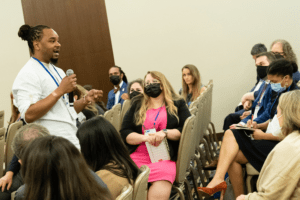
Healing, and Transformation” at the 2022 ACS National Convention
Truth, Racial Healing and Transformation
ACS is committed to reckoning with how our laws and legal systems, including the legal profession, have contributed to the perpetuation of racial inequity. That’s why in 2021, ACS announced its support for Truth, Racial Healing, and Transformation (TRHT) in the United States. In 2022, ACS and its chapters hosted five programs on TRHT, and included TRHT as a central focus of both its 2022 Student Convention and 2022 Annual Convention. ACS also hosted a convening highlighting the unique ability of state attorneys general to advance TRHT, which brought together people from nearly 20 state attorney general offices. ACS established a Student Task Force on TRHT, which meets regularly to discuss more ways that ACS can support TRHT at the national, state, and local levels.
Abolition of the Death Penalty
As part of ACS’s commitment to abolishing the death penalty in the United States, ACS continued to advocate for President Biden to issue a blanket commutation of federal death sentences. ACS engaged the White House and the Hill in pursuit of achieving this goal in the next two years. ACS also joined the International Coalition to Abolish the Death Penalty and made death penalty abolition one of the central foci of ACS’s expanding international work.
The Equal Rights Amendment as the 28th Amendment
ACS worked with coalition partners throughout 2022 to advocate in support of recognizing the Equal Rights Amendment (ERA) as the 28th Amendment to the Constitution. In response to a request from the House Committee on Oversight and Reform for his views on the ERA’s current legal status, ACS President Russ Feingold wrote a public letter to Chairwoman Maloney and engaged other members of Congress and the White House.
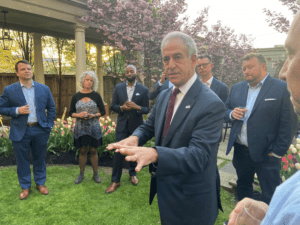
Courts Matter in Protecting Reproductive Rights
In response to the U.S. Supreme Court’s overturning of Roe v. Wade, ACS centered the importance of state courts in protecting abortion rights at the state level. As part of its Run.Vote.Work. Initiative, ACS used its podcast, social media, chapter events, and publications to amplify the importance of state courts and of voters who “vote abortion” to vote in state court races.
The Threat of an Article V Convention
ACS has been outspoken on the threat to our democracy from an Article V Convention for some time, but in 2022, ACS stepped up its efforts to become one of the leading organizations warning against the constitutional crisis that could result from the Right’s efforts to radically rewrite the Constitution. ACS Chapters held dozens of events in 2022 to raise awareness of this threat, many centering Russ Feingold’s book “The Constitution in Jeopardy”. Additionally, ACS utilized its podcast and publications to educate the public about Article V and the inherent dangers in convening a convention that has no established rules or guidelines.
Law and the Political Economy
Through a series of national and chapter events over the past several years, ACS has worked to advance Law and the Political Economy (LPE), with the aim of reversing decades-long trends in law and policy that perpetuate inequality, entrench hierarchies, and facilitate exploitation. The goal of LPE is to democratize the political economy and nurture the creation of more just and equitable laws and systems. As part of this work, this fall, ACS co-hosted a conference entitled Reviving Progressive Constitutional Political Economy, which brought together legal scholars, political scientists, historians, journalists, political leaders, and legislative and agency policymakers to explore what it would mean to put constitutional arguments at the core of LPE, and to return political economy arguments to the heart of constitutional politics. The conference considered how constitutional arguments hostile to present U.S. Supreme Court doctrine can develop and thrive in political settings outside the courts, such as legislatures and administrative agencies. The discussion also focused on how participants, particularly those who work in legislatures and administrative agencies, can consider and incorporate the constitutional dimensions of “economic” fields of law including antitrust, labor and employment, and banking and financial regulation. Two additional conferences focused on these issues are planned for March and April 2023.
Shaping the Progressive Legal Debate
ACS’s capacity for shaping local and national narratives continues to grow. In 2022, ACS and its chapters hosted over 1,400 programs, 50 podcast episodes, candidate forums, and convenings on urgent and emerging issues. Anchored by ACS scholars, experts, staff, and movement builders, these events drove thought leadership on important policy and legal priorities and shaped the public narrative on issues like Supreme Court reform, countering “originalism,” and emerging threats to the rule of law.
Together Again
ACS hosted its annual National Convention in June 2022, its first in-person convention since before the pandemic. The Convention brought together over 400 students, lawyers, and activists in Washington, DC, and online for three days of programming and network events. The Convention was anchored by special guest speaker U.S. Supreme Court Justice Sonia Sotomayor. Programming included panels about the threat autocracy poses to democracy, the future of reproductive justice lawyering, and the ways in which progressive lawyers can engage with Truth, Racial Healing, and Transformation work. The Convention included remarks by U.S. Associate Attorney General Vanita Gupta, U.S. Senator Alex Padilla, and U.S. Representative Jamie Raskin.

